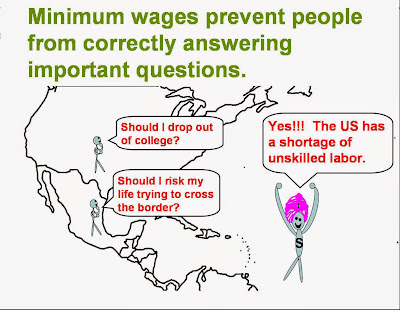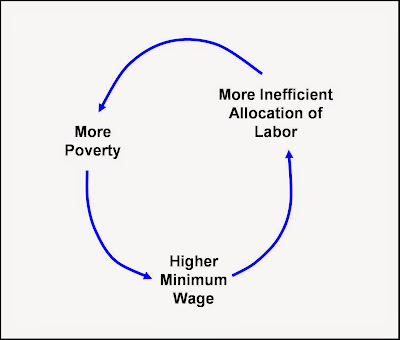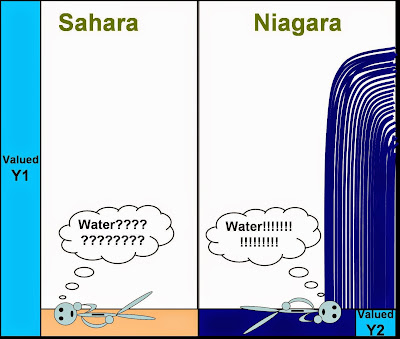The Nobel Prize liberal economist Paul Krugman recently argued that we need more government because people tend to make poor education/career decisions. Shortly after reading Krugman's case for bigger government, I read an article in the LA Times about how some people in the Philippines were lured to America with the false promise of high wages.
Somewhat inspired by this very popular blog entry... A Week of Shorter Rod Drehers... I patched together some relevant snippets from Paul Krugman...
Krugman: The world economy is a system -- a complex web of feedback relationships -- not a simple chain of one-way effects
Krugman: Wages, prices, trade, and investment flows are outcomes, not givens
Krugman: Wages are a market price--determined by supply and demand
Krugman: Money still talks — indeed, thanks in part to the Roberts court, it talks louder than ever
Krugman: Raise minimum wages by a substantial amount
Krugman: The price of labor--unlike that of gasoline, or Manhattan apartments--can be set based on considerations of justice, not supply and demand, without unpleasant side effects
Krugman: Your decision to stay in school or go out and work will shape your lifetime career
Krugman: Now, the fact is that people make decisions like these badly
Krugman: Bad choices in education are the norm where choice is free
Krugman: He and his unwary readers imagine that his conclusions simply emerge from the facts, unaware that they are driven by implicit assumptions that could not survive the light of day
If you'd like the context, just click the links. As you can see... Krugman used to be an opponent of minimum wages... but now he's a proponent.
From my perspective, a minimum wage is a problem because it doesn't accurately communicate the demand for unskilled labor in any given area. This increases the chances that people will make really bad career/education decisions. Here's how I've illustrated this...
And here's another attempt...
My drawing skills aren't that great... but hopefully you should get the idea that, in this drawing, the US has more than enough people pushing brooms (unskilled labor). In economics... "more than enough" means that there's a surplus. Usually when there's a surplus of something the price will accurately communicate this information to the entire world. A low price says "hey, we have more than enough!". This important information helps people make informed decisions. When this important information changes, people's decisions will change accordingly. So in order for the US to have ended up with such a massive surplus of unskilled labor... something must have gone wrong with the price system. And that something is the minimum wage. A minimum wage says, "hey, we don't have enough unskilled labor!".
A minimum wage creates a vicious cycle. When wages falsely signal that the US has a shortage of unskilled labor... this increases the chances that people will make big mistakes. Students are more likely to make the big mistake of dropping out of school and unskilled immigrants are more likely to make the big mistake of risking their lives to move here. The logical consequence of so many people making big mistakes is an increase in poverty... which is then used to justify an increase in the minimum wage.
So what would happen if we eliminated minimum wages? I'm guessing that wages for unskilled labor will decrease. And I'm sure that proponents of a minimum wage would guess the same thing. Right? Because if we eliminated the minimum wage... and wages didn't decrease... then there wouldn't be a need for a minimum wage.
If proponents of a minimum wage want to guess that eliminating the minimum wage would result in a huge decrease in wages... then, assuming that they are correct, this huge decrease would reveal that there is indeed a huge surplus of unskilled labor in the US. This would conclusively confirm the problem with lying to people about the demand for unskilled labor (aka "a minimum wage").
Would chaos ensue if we learned that there actually was a huge surplus of unskilled labor in the US? Well... no. Take China for example. They used to have a huge surplus of cheap labor... but now they don't...
Wages in China really didn't skyrocket because of a minimum wage... they skyrocketed because of the massive demand for cheap labor...Costs are soaring, starting in the coastal provinces where factories have historically clustered (see map). Increases in land prices, environmental and safety regulations and taxes all play a part. The biggest factor, though, is labour. - The Economist, The end of cheap China
In case you didn't actually dig through all those Krugman articles that I shared earlier, I'll point out that he vociferously argued against the idea that the massive increase in the global supply of cheap labor had anything to do with wages stagnating in the US. Eventually he acknowledged that perhaps there were some issues with his "implicit assumptions".While corporations may look elsewhere for still cheaper labor, there are no more Chinas out there. Other countries that establish themselves as low-wage havens will soon be overwhelmed by the inflow of capital from the United States, Europe, Japan, and now China. They cannot possibly have the same dampening effect on wages in the United States over the next three decades as did China and other developing countries in the last three decades. - Dean Baker, Living in the Short-Run: Comment on Capital in the 21st Century
Let's review! Here are two possibilities of eliminating the minimum wage here in the US...
1. Wages don't plummet. Then there's really no point in having a minimum wage.
2. Wages do plummet. Then the US "will soon be overwhelmed by the inflow of capital from the United States, Europe, Japan, and now China".
We really don't help anybody by giving people bad directions. If you truly want to help poor people... then start a business. Give poor people a better option (builderism). Especially if you have a strong theory that some existing business is making a stupid mistake. Put your strong theory to the test by starting a business that doesn't make the same stupid mistake. Maybe you want to argue that starting a business is too difficult? Well there you go. You've successfully identified a huge problem. It's a huge problem when it's too difficult to give poor people better options. Please figure out how to make it easier for somebody as intelligent as yourself to start a business. And if you can't figure it out... then please have some respect for anybody who does manage to successfully start and run a business that employs/serves any amount of people.
Site Information
About Us
- RonPaulForums.com is an independent grassroots outfit not officially connected to Ron Paul but dedicated to his mission. For more information see our Mission Statement.







 Reply With Quote
Reply With Quote









Connect With Us